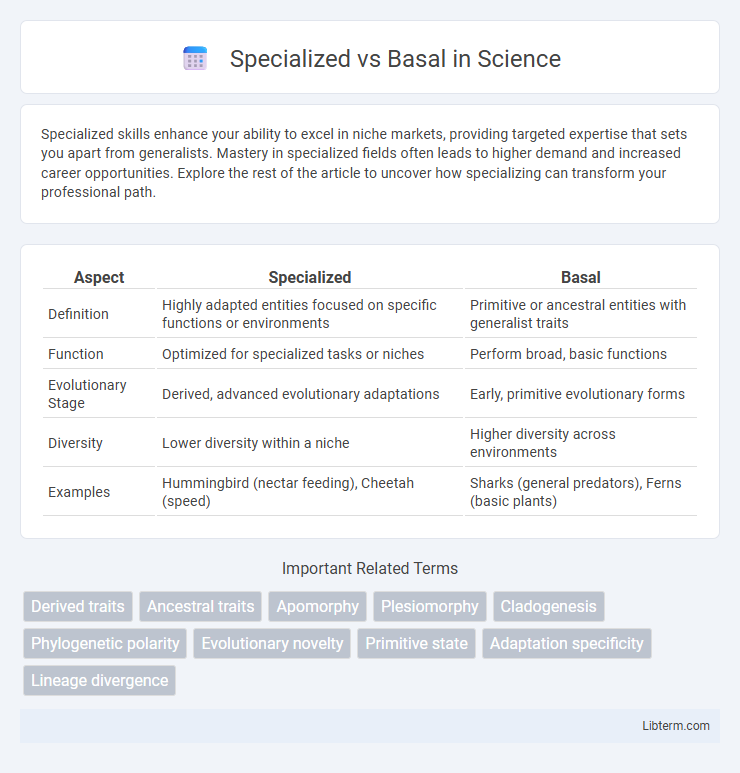Specialized skills enhance your ability to excel in niche markets, providing targeted expertise that sets you apart from generalists. Mastery in specialized fields often leads to higher demand and increased career opportunities. Explore the rest of the article to uncover how specializing can transform your professional path.
Table of Comparison
| Aspect | Specialized | Basal |
|---|---|---|
| Definition | Highly adapted entities focused on specific functions or environments | Primitive or ancestral entities with generalist traits |
| Function | Optimized for specialized tasks or niches | Perform broad, basic functions |
| Evolutionary Stage | Derived, advanced evolutionary adaptations | Early, primitive evolutionary forms |
| Diversity | Lower diversity within a niche | Higher diversity across environments |
| Examples | Hummingbird (nectar feeding), Cheetah (speed) | Sharks (general predators), Ferns (basic plants) |
Understanding Specialized and Basal: Key Definitions
Specialized cells possess distinct structures and functions tailored to specific tasks, such as muscle cells for contraction or neurons for signal transmission, enabling complex biological processes. Basal cells serve as undifferentiated progenitors that can divide and differentiate into specialized cells, maintaining tissue regeneration and repair. Understanding the roles of specialized and basal cells is crucial for insights into developmental biology, tissue homeostasis, and regenerative medicine.
Historical Perspectives on Specialization and Basal Approaches
Historical perspectives reveal that specialized approaches originated from early efforts to improve efficiency by focusing on specific functions within complex systems, while basal approaches emerged from foundational theories emphasizing broad, interconnected processes. Specialized methods evolved through industrial and scientific advancements targeting niche expertise, contrasting with basal strategies rooted in holistic and integrative frameworks seen in classical biology and early cognitive science. The progression of specialization reflects a trend toward precision and compartmentalization, whereas basal approaches maintain a focus on general principles and fundamental structures.
Core Differences Between Specialized and Basal Strategies
Specialized strategies concentrate resources on a narrow market segment, enhancing expertise and efficiency within a specific niche to achieve competitive advantage. Basal strategies adopt a broader approach, targeting multiple market segments with diverse offerings to spread risk and maximize overall market coverage. Core differences lie in focus scope, resource allocation, and adaptability, with specialized strategies excelling in depth and basal strategies in breadth.
Advantages of Specialized Methods
Specialized methods offer targeted solutions that enhance efficiency and accuracy by addressing specific tasks or domains, leading to improved performance in specialized applications such as medical diagnostics or financial forecasting. These methods leverage domain-specific knowledge and tailored algorithms, resulting in faster processing times and reduced errors compared to generic basal approaches. The precision and adaptability of specialized methods make them indispensable for complex problems requiring expert-level understanding and nuanced decision-making.
Benefits of Basal Approaches
Basal approaches emphasize foundational skills and general learning strategies that support long-term cognitive development and adaptability across various subjects. These methods foster critical thinking, problem-solving, and the ability to apply knowledge broadly, enhancing overall educational outcomes. By promoting a solid base of essential competencies, basal approaches prepare learners for more specialized content and complex challenges in diverse academic and real-world contexts.
Contexts Where Specialized Is Preferred
Specialized language excels in technical fields such as medicine, law, and engineering, where precision and clarity are paramount to avoid misinterpretation. In academic research and industry-specific documentation, specialized terminology enhances communication efficiency and ensures accurate knowledge transfer. Contexts involving complex concepts or advanced expertise consistently favor specialized vocabulary to meet the demands of expert audiences.
Situations Best Suited for Basal Approaches
Basal approaches excel in structured learning environments where foundational skills and gradual knowledge acquisition are critical, such as early childhood education and basic literacy programs. They are best suited for learners who require systematic instruction, clear progression, and consistent reinforcement of core concepts. These methods support students needing step-by-step guidance to build confidence before advancing to more complex, specialized content.
Impact on Learning Outcomes: Specialized vs Basal
Specialized education programs, tailored to individual student strengths and interests, significantly enhance learning outcomes by fostering deeper engagement and mastery of specific skills. Basal reading programs provide a structured, uniform approach that ensures basic literacy skills are systematically developed across diverse student populations. Research indicates that integrating specialized instruction within basal frameworks yields optimal results, balancing broad foundational skills with targeted cognitive development.
Choosing the Right Approach: Factors to Consider
Choosing between specialized and basal approaches depends on project goals, resource availability, and desired outcomes. Specialized methods offer targeted solutions ideal for specific tasks, while basal approaches provide broad, general-purpose frameworks adaptable across various domains. Evaluating factors such as scalability, complexity, and domain specificity ensures the selection aligns with both current needs and future growth.
Future Trends in Specialized and Basal Practices
Future trends in specialized practices emphasize integration of AI and machine learning to provide personalized, data-driven insights that enhance decision-making and efficiency across industries. Basal practices are evolving through automation and standardized protocols to ensure consistency and scalability in foundational operations, supporting broader organizational agility. Emerging technologies like blockchain and IoT are expected to further differentiate specialized solutions by enabling real-time, secure data sharing while basal processes focus on streamlining core functions with minimal human intervention.
Specialized Infographic

 libterm.com
libterm.com